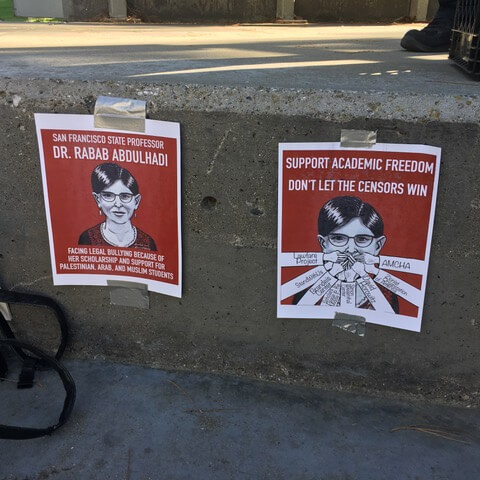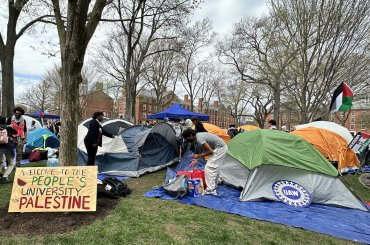Students, faculty, alumni, labor leaders, clergy, members of the historic 1968 student strike, and community members gathered at the Malcolm X Plaza at San Francisco State University this week to protest President Lynn Mahoney’s undermining of San Francisco State University (SFSU) faculty integrity, the spirit of ’68 historic commitment to social justice, and the Arab and Muslim Ethnicities and Diasporas studies program (AMED) and its founding director Dr. Rabab Abdulhadi.
SFSU Alumni and AMED community supporters were outraged by President Mahoney’’s decision to veto the unanimous ruling by a Faculty Hearing Panel, which conducted a six-hour hearing on the arbitrary cancellation by Zoom and other private tech companies of Drs. Abdulhadi and Kinukawa’s online open classroom, “Whose Narratives? Gender, Justice and Resistance: A Conversation with Leila Khaled.” The rally emphasized that the university is bound by contract, law, labor rights, and the AAUP (Association of American University Professors) policy to protect academic freedom rather than subcontracting the responsibility to private companies. Further, universities must maintain structural independence from the whims and demands of partisan lobbying organizations, including Zionist groups like the Academic Engagement Network (AEN), Hillel International, and the Lawfare Project.

In its ruling, now vetoed by President Mahoney, the Faculty Panel affirmed that: “San Francisco State University has inflicted harm upon Dr. Abdulhadi (and co-instructor, Dr. Kinukawa) and that her academic freedom was, in fact, violated. …[T]he university did not provide adequate support to Dr. Abdulhadi against the actions of the corporate entity, Zoom, and, more importantly against the outside organization, Lawfare Project.” Furthermore, the Panel ordered the university to provide remedies in the form of a public apology to Dr. Abdulhadi and to provide “a site for rescheduling the event with Leila Khaled on an alternate platform, without interference”.
Distinguished speakers were united in their condemnation of President Mahoney’s dismissive decision of the Faculty Panel’s decision. The panel recommended redress to Dr. Rabab Abdulhadi for the University’s failure to protect Professor Abdulhadi’s and her colleague Dr. Tomomi Kinukawa’s academic freedom from corporate and Zionist interference. Dr. James Martel, chapter President of CFA at SFSU expressed solidarity with the two professors. He stated that it is “troubling to have a private corporation be in charge of academic freedom.” Mahoney’s claim to be a proponent of academic freedom, Martel insisted, is contradicted by her actions, adding that “saying that you’re for free speech is meaningless if, when things get tough, you don’t do anything”.
Dr. Hatem Bazian, SFSU alumna and Professor of Ethnic Studies at UC Berkeley, accused the University of long-standing Islamophobia: SFSU “should have welcomed, embraced, and funded” Dr. Abdulhadi and AMED” but instead subjected her the program, and its students to “structural torture on a daily basis”. Of the University’s targeting of Dr. Abdulhadi, he said that the University has only “one Palestinian professor – I guess that is one too many!”
President Mahoney’s veto is the latest manifestation of SFSU’s policy of harassment of Dr. Abdulhadi, intensifying its efforts to dismantle AMED, while confirming its complicity with national Zionist organizations that seek to silence and bully Palestinian voices on campuses. Rev. Michael Yoshii of the United Methodist clergy and Co-Chair of Friends of Wadi Foquin found President Mahoney’s decision to be “profoundly immoral and spiritually bankrupt”.
“It’s been very disturbing to witness the University attempt to disrupt and shut down AMED,” declared Noura Khouri, an SFSU alumna and a co-organizer of the rally with ‘68 veteran striker, Steve Zeltzer. Khouri stressed that the University’s actions present “a grave danger to all of us . As a community, we are prepared and committed to fight until our demands are met”. Leith Ghuloum, current graduate student in the Ethnic Studies MA program expressed their disappointment over the refusal of the College to offer a graduate AMED Studies seminar. Ghuloum spoke about the collective demand by the first and second year Ethnic Studies graduate cohorts who were joined by seven other cohorts from 2008 to the present. As a result, “my cohorts will graduate without the support of our University” adding that students are “trying to study [AMED] something that the University is against”.
Leading the rally with chants of “Stand Up, Fight Back,” national organizer Nadya Tannous introduced a statement of support by the Palestinian Youth Movement (PYM), calling on President Mahoney “to offer unwavering support for AMED and Dr. Abduhadi.” “While the University “advertises its diversity, it is willing to shut [AMED] down for the interests of corporate donors,” PYM declared.
Grace Shimizu of the Japanese Peruvian Oral History Project, discussed the long history of AMED’s commitment to the indivisibility of justice, by bringing together campus and communities, as shown in its leadership in commemorating the Day of Remembrance for the WWII mass incarceration of Japanese Americans and the opposition to “enemy aliens.” Shimizu remarked that SFSU’s discrimination against Dr. Abdulhadi reflects a “stench that is deep rooted.” She called on the University to “honor its commitment to our communities” and stop its campaign to dismantle AMED.
Dr. Tomomi Kinukawa, faculty lecturer in Women and Gender Studies, emphasized how the AMED program “reflects the spirit of the ‘68 strikers,” a long and proud history of SFSU activism and commitment to academic integrity that includes and reflects the diverse and historically marginalized voices of BIPOC communities. Led by the Black Student Union and the Third World Liberation Front, the 1968 Student Strike, which commenced this month 53 years ago, is hailed as the Student Strike that Changed Higher Ed Forever, and was successful in establishing the first Ethnic Studies College in the country.
Steve Zeltzer, an SFSU alum and a veteran of the ‘68 strike, expressed his outrage that “we would be back here at SFSU to defend the principles we were fighting for in ‘68”. He defended the “right of people around the world to speak out about their history and their struggles.”
The rally demanded a reversal of President Mahoney’s decision, calling on SFSU to honor its legacy of a free and inclusive academic culture, rather than practicing Islamophobia and anti-Arab and anti-Palestinian bias, while dismantling AMED and its commitment to critical ethnic studies in favor of the corporate bottom line. In particular, SFSU alumni and their faculty and community supporters demanded full funding of AMED, including the hiring of two tenure track professors, an end to the harassment of Dr. Abdulhadi, and the termination of the corporate and Zionist lobbying that precludes academic freedom.



1 of 2
From Canada:
Former Israeli Soldiers Speak out: There is Nothing So Whole as a Broken Heart – Palestine Chronicle
“Former Israeli Soldiers Speak out: There is Nothing So Whole as a Broken Heart” The Palestine Chronicle, Nov. 11/21, by Jim Miles
EXCERPT:
“Last week (2021-11-04), Independent Jewish Voices (IJV – Canada) presented a webinar titled “From IDF to IJV”, telling the story of three Jewish members who were former Israeli Defence Force (IDF) participants, but over the years and through similar yet varying experiences, ended up working with IJV Canada.
“The host for the show, Aaron Lakoff, indicated IJV’s ‘uncompromising solidarity’ with the struggles of the Palestinian people for humanitarian rights and civil equality in Palestine, in essence, all of historical Palestine. IJV was one of the first organizations in Canada to recognize and support the BDS campaign. In summing up the overall aspect of a person’s recognition of having been lied to by family, government, and mainstream society, a reference from the radical Jewish writings of Kokzter Rebbe was made, ‘There is nothing so whole as a broken heart.’ Its meaning did not really strike until I heard the three histories “From IDF to IJV.”
Narrative
“All three participants tended to have similar yet varying experiences, the main commonality to start was their secular Judaism, with their religion of being Jewish replaced with the religion of Zionism. Participation in the IDF was assumed and was a course of action supported by much propaganda. It was an army like no other, the most moral army in the world.
“The host for the webinar, Lia Tarachansky, indicated the army has changed in three significant ways: first, the majority of effort put into Unit 8200, the Army Intelligence Unit and its massive surveillance and hasbara efforts; next she mentioned the increasing use of a ‘remote control’ army, using modern AI and robotics to challenge any created enemy; and – most surprisingly, although in line with US efforts perhaps not – the privatization of army functions in an attempt to absolve the government of responsibility for blame. (cont’d)
2 of 2
Realizations
“While accepting their involvement with the IDF at first, over time – sometimes rapidly – the IDF members became more and more disillusioned with the IDF and with Israeli policy in general. For Daphna Levit, a Mizrahi Jew, the military as presented in schools, was ‘always something we looked up to’ and the role of the IDF was a ‘glorious, heroic effort’ to the degree that it was ‘good to die for the country’ – God had become Zion. Her function in the 1967 war was to escort media personnel to different war zones, and in the process, ‘create a narrative’ that was different from what she saw. In particular, she mentioned watching as Palestinian refugees were crossing the Allenby Bridge into Jordan, watching a scene her delivered narrative did not describe accurately.
“Yom Shamash ventured to Israel in 1971, feeling ‘confident’ in Israel, and that it was at peace as Egypt was ‘neutralized.’ Describing himself as ‘a terrible soldier’ he was posted in the Sinai Desert when the Yom Kippur war took ‘everyone by surprise’ and he indicated ‘my unit was decimated’. He began to question the sense of it all, asking ‘what did they die for…sand?’ It struck home harder when he learned that Golda Meier had rejected Anwar Sadat’s desire for peace talks. Previous to that, during his training, he recalled being out on night patrol training, and became aware that the funny feeling under his boots came from ‘stepping on vegetables’ – their training had trampled on Palestinian gardens.”
My deepest thanks to the SF community for standing up to this pervasive, toxic corruption of our freedom of thought and speech.